1872 Liberal Republican convention
An influential group of dissident Republicans split from the party to form the Liberal Republican Party in 1870. At the party's only national convention, held in Cincinnati in 1872, New York Tribune editor Horace Greeley was nominated for President on the sixth ballot, defeating Charles Francis Adams. Missouri Governor Benjamin Gratz Brown was nominated for vice-president on the second ballot. They were also nominated at the 1872 Democratic National Convention two months later.[1]
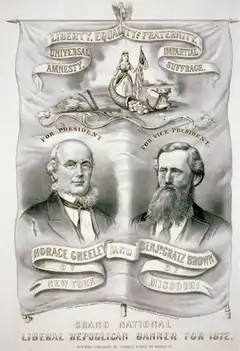
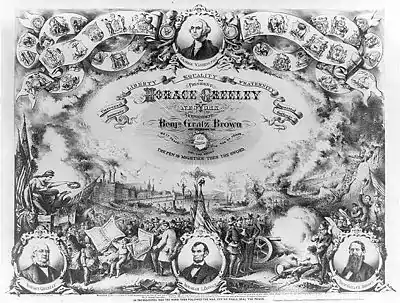
| 1872 presidential election | |
.jpg.webp) 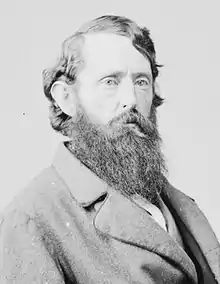 Nominees Greeley and Brown | |
| Convention | |
|---|---|
| Date(s) | May 1–3, 1872 |
| City | Cincinnati, Ohio |
| Candidates | |
| Presidential nominee | Horace Greeley of New York |
| Vice presidential nominee | Benjamin Gratz Brown of Missouri |
Balloting
Liberal Republican candidates:
- Horace Greeley, former U.S. representative from New York
- Charles Francis Adams, former U.S. representative from Massachusetts
- Lyman Trumbull, U.S. senator from Illinois
- Benjamin Gratz Brown, governor of Missouri
- David Davis, Associate Justice from Illinois
- Andrew Curtin, former governor of Pennsylvania
- Salmon P. Chase, Supreme Court Chief Justice from Ohio
Candidates gallery
.jpg.webp)

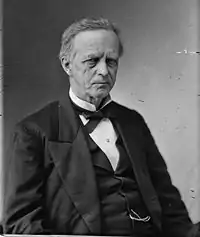
Senator Lyman Trumbull of Illinois 
Governor Benjamin Gratz Brown of Missouri
(Withdrew on 1st Ballot - Endorsed Greeley)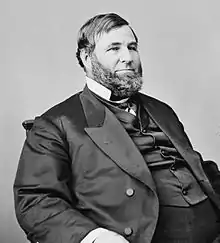
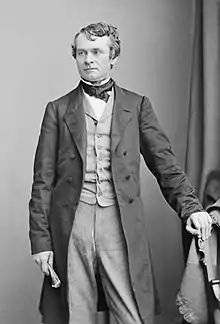
Former Governor Andrew Curtin of Pennsylvania
(Withdrew after 1st Ballot)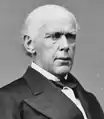
Presidential
| Presidential Ballot | |||||||||
| Ballot | 1st | 2nd | 2nd Revised | 3rd | 4th | 5th | 6th | 6th Revised | |
|---|---|---|---|---|---|---|---|---|---|
| Horace Greeley | 147 | 239 | 245 | 258 | 251 | 258 | 332 | 482 | |
| Charles Francis Adams | 205 | 243 | 243 | 264 | 279 | 309 | 324 | 187 | |
| Lyman Trumbull | 110 | 148 | 148 | 156 | 141 | 91 | 19 | 21 | |
| Benjamin Gratz Brown | 95 | 2 | 2 | 2 | 2 | 2 | 0 | 0 | |
| David Davis | 92.5 | 81 | 75 | 44 | 51 | 30 | 6 | 6 | |
| Andrew Gregg Curtin | 62 | 0 | 0 | 0 | 0 | 0 | 0 | 0 | |
| Salmon P. Chase | 2.5 | 1 | 1 | 0 | 0 | 24 | 32 | 0 | |
| John M. Palmer | 0 | 0 | 0 | 0 | 0 | 0 | 1 | 0 | |
| Others | 0 | 0 | 0 | 0 | 0 | 0 | 0 | 18 | |
| Blank | 10 | 10 | 10 | 0 | 0 | 10 | 10 | 10 | |
Source: US President - LR Convention. Our Campaigns. (August 27, 2009).
Vice Presidential
| Vice-Presidential Ballot | ||
| Ballot | 1st | 2nd |
|---|---|---|
| Benjamin Gratz Brown | 237 | 435 |
| Lyman Trumbull | 158 | 175 |
| George Washington Julian | 134.5 | 0 |
| Gilbert Carlton Walker | 84.5 | 75 |
| Cassius Marcellus Clay | 34 | 0 |
| Jacob Dolson Cox | 25 | 0 |
| Others | 20 | 11 |
Source: US Vice President - LR Convention. Our Campaigns. (August 27, 2009).
Platform
The Liberal platform called for an end to the hatreds of the American Civil War and Reconstruction (sections 2 and 3), demanded civil service reform to curb corruption (section 5), and hedged on the tariff issue (section 6).
We, the Liberal Republicans of the United States in National Convention assembled at Cincinnati, proclaim the following principles as essential to just government.
- First: We recognize the equality of all men before the law, and hold that it is the duty of Government in its dealings with the people to mete out equal and exact justice to all of whatever nativity, race, color, or persuasion, religious or political.
- Second: We pledge ourselves to maintain the union of these States, emancipation, and enfranchisement, and to oppose any re-opening of the questions settled by the Thirteenth, Fourteenth, and Fifteenth Amendments to the Constitution.
- Third: We demand the immediate and absolute removal of all disabilities imposed on account of the Rebellion, which was finally subdued seven years ago, believing that universal amnesty will result in complete pacification in all sections of the country.
- Fourth: Local self-government, with impartial suffrage, will guard the rights of all citizens more securely than any centralized power. The public welfare requires the supremacy of the civil over the military authority, and freedom of person under the protection of the habeas corpus. We demand for the individual the largest liberty consistent with public order; for the State, self-government, and for the nation a return to the methods of peace and the constitutional limitations of power.
- Fifth: The Civil Service of the Government has become a mere instrument of partisan tyranny and personal ambition and an object of selfish greed. It is a scandal and reproach upon free institutions and breeds a demoralization dangerous to the perpetuity of republican government. We therefore regard such thorough reforms of the Civil Service as one of the most pressing necessities of the hour; that honesty, capacity, and fidelity constitute the only valid claim to public employment; that the offices of the Government cease to be a matter of and patronage, and that public station become again a post of honor. To this end it is imperatively required that no President shall be a candidate for re-election.
- Sixth: We demand a system of Federal taxation which shall not unnecessarily interfere with the industry of the people, and which shall provide the means necessary to pay the expenses of the Government economically administered, the pensions, the interest on the public debt, and a moderate reduction annually of the principal thereof; and, recognizing that there are in our midst honest but irreconcilable differences of opinion with regard to the respective systems of Protection and Free Trade, we remit the discussion of the subject to the people in their Congress Districts, and to the decision of Congress thereon, wholly free of Executive interference or dictation.
- Seventh: The public credit must be sacredly maintained, and we denounce repudiation in every form and guise.
- Eighth: A speedy return to specie payment is demanded alike by the highest considerations of commercial morality and honest government.
- Ninth: We remember with gratitude the heroism and sacrifices of the soldiers and sailors of the Republic, and no act of ours shall ever detract from their justly-earned fame or the full reward of their patriotism.
- Tenth: We are opposed to all further grants of lands to railroads or other corporations. The public domain should be held sacred to actual settlers.
- Eleventh: We hold that it is the duty of the Government, in its intercourse with foreign nations to cultivate the friendship of peace, by treating with all on fair and equal terms, regarding it alike dishonorable either to demand what is not right, or to submit to what is wrong.
- Twelfth: For the promotion and success of these vital principles and the support of the candidates nominated by this Convention, we invite and cordially welcome the co-operation of all patriotic citizens, without regard to previous affiliations.
References
- Matthew T. Downey, "Horace Greeley and the Politicians: The Liberal Republican Convention in 1872." Journal of American History 53.4 (1967): 727-750.
- Liberal Republican Party. National Convention (1872 : Cincinnati, Ohio); YA Pamphlet Collection (Library of Congress) DLC (1872). Proceedings of the Liberal Republican Convention, in Cincinnati, May 1st, 2d, and 3d, 1872 : Horace Greeley's letter of acceptance, address of the New York State Committee to their fellow-citizens. University of California. New York : Baker & Godwin.
Further reading
- Downey, Matthew T. "Horace Greeley and the Politicians: The Liberal Republican Convention in 1872." Journal of American History 53.4 (1967): 727-750. online